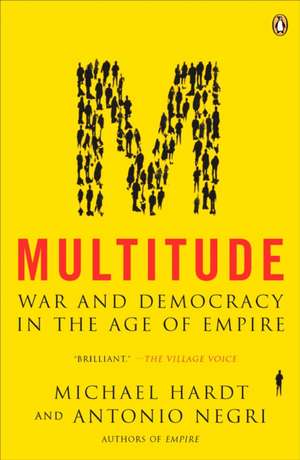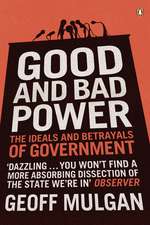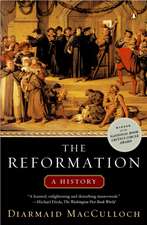Multitude: War and Democracy in the Age of Empire
Autor Michael Hardt, Antonio Negrien Limba Engleză Paperback – 30 iun 2005 – vârsta de la 18 ani
In their international bestseller Empire, Michael Hardt and Antonio Negri presented a grand unified vision of a world in which the old forms of imperialism are no longer effective. But what of Empire in an age of “American empire”? Has fear become our permanent condition and democracy an impossible dream? Such pessimism is profoundly mistaken, the authors argue. Empire, by interconnecting more areas of life, is actually creating the possibility for a new kind of democracy, allowing different groups to form a multitude, with the power to forge a democratic alternative to the present world order.Exhilarating in its optimism and depth of insight, Multitude consolidates Hardt and Negri’s stature as two of the most important political philosophers at work in the world today.
Preț: 139.58 lei
Nou
Puncte Express: 209
Preț estimativ în valută:
26.72€ • 27.53$ • 22.55£
26.72€ • 27.53$ • 22.55£
Carte disponibilă
Livrare economică 08-22 februarie
Preluare comenzi: 021 569.72.76
Specificații
ISBN-13: 9780143035596
ISBN-10: 0143035592
Pagini: 426
Dimensiuni: 164 x 216 x 24 mm
Greutate: 0.4 kg
Ediția:Reprint
Editura: Penguin Books
ISBN-10: 0143035592
Pagini: 426
Dimensiuni: 164 x 216 x 24 mm
Greutate: 0.4 kg
Ediția:Reprint
Editura: Penguin Books
Cuprins
Preface: Life in Common
1. War
1.1 Simplicissimus
Exemptions
Golem
The GLobla State of War
Biopower and Security
Legitimate Violence
Samuel Huntington, Geheimrat
1.2 Counterinsurgencies
Birth of the New War
Revolution in Military Affairs
The Mercenary and the Patriot
Asymmetry and Full-Spectrum Dominance
1.3 Resistance
The Primacy of Resistance
From the People's Army to Guerrilla Warfare
Inventing Network Struggles
Swarm Intelligence
From Biopower to Biopolitical Production
2. Multitude
2.1 Dangerous Classes
The Becoming Common of Labor
The Twilight of the Peasant World
Two Italians in India
The Wealth of the Poor (or, We Are the Poors!)
Demonic Multitudes: Dostoyevsky Reads the Bible
Excursus 1: Method: In Marx's Footsteps
Death of the Dismal Science?
2.2 De Corpore
Global Apartheid
A Trip to Davos
Big Government Is Back
Life on the Market
2.3 Traces of the Multitude
The Monstrosity of the Flesh
Invasion of the Monsters
Production of the Common
Beyond Private and Public
Carnival and Movement
Mobilization of the Common
Excursus 2: Organization: Multitude on the Left
3. Democracy
3.1 The Long March of Democracy
Crisis of Democracy in the Era of Armed Globalization
The Unfinished Democratic Project of Modernity
Debtors' Rebellion
The Unrealized Democracy of Socialism
Revolt, Berlin
From Democratic Representation to GLobal Public Demands
White Overalls
3.2 Global Demands for Democracy
Caheirs de doléances
Convergence in Seattle
Experiments in Global Reform
Back to the Eighteenth Century!
Excursus 3: Strategy: Geopolitics and New Alliances
3.3 Democracy of the Multitude
Sovereignty and Democracy
May the Force Be with You
The New Science of Democracy: Madison and Lenin
Notes
Index
1. War
1.1 Simplicissimus
Exemptions
Golem
The GLobla State of War
Biopower and Security
Legitimate Violence
Samuel Huntington, Geheimrat
1.2 Counterinsurgencies
Birth of the New War
Revolution in Military Affairs
The Mercenary and the Patriot
Asymmetry and Full-Spectrum Dominance
1.3 Resistance
The Primacy of Resistance
From the People's Army to Guerrilla Warfare
Inventing Network Struggles
Swarm Intelligence
From Biopower to Biopolitical Production
2. Multitude
2.1 Dangerous Classes
The Becoming Common of Labor
The Twilight of the Peasant World
Two Italians in India
The Wealth of the Poor (or, We Are the Poors!)
Demonic Multitudes: Dostoyevsky Reads the Bible
Excursus 1: Method: In Marx's Footsteps
Death of the Dismal Science?
2.2 De Corpore
Global Apartheid
A Trip to Davos
Big Government Is Back
Life on the Market
2.3 Traces of the Multitude
The Monstrosity of the Flesh
Invasion of the Monsters
Production of the Common
Beyond Private and Public
Carnival and Movement
Mobilization of the Common
Excursus 2: Organization: Multitude on the Left
3. Democracy
3.1 The Long March of Democracy
Crisis of Democracy in the Era of Armed Globalization
The Unfinished Democratic Project of Modernity
Debtors' Rebellion
The Unrealized Democracy of Socialism
Revolt, Berlin
From Democratic Representation to GLobal Public Demands
White Overalls
3.2 Global Demands for Democracy
Caheirs de doléances
Convergence in Seattle
Experiments in Global Reform
Back to the Eighteenth Century!
Excursus 3: Strategy: Geopolitics and New Alliances
3.3 Democracy of the Multitude
Sovereignty and Democracy
May the Force Be with You
The New Science of Democracy: Madison and Lenin
Notes
Index
Recenzii
"This timely book brings together myriad loose strands of far left thinking with clarity, measured reasoning and humor." —Publishers Weekly, starred
"Impressive… a rare and exciting work of synthesis." —Booklist, starred review
"Brilliant." —The Village Voice
"An inspiring marriage of realism and idealism." —Naomi Klein, author of No Logo
"Impressive… a rare and exciting work of synthesis." —Booklist, starred review
"Brilliant." —The Village Voice
"An inspiring marriage of realism and idealism." —Naomi Klein, author of No Logo
"This timely book brings together myriad loose strands of far left thinking with clarity, measured reasoning and humor." --Publishers Weekly, starred"Impressive... a rare and exciting work of synthesis." --Booklist, starred review"Brilliant." --The Village Voice"An inspiring marriage of realism and idealism." --Naomi Klein, author of No Logo
Notă biografică
Michael Hardt is a professor in the literature program at Duke University.
Antonio Negri is an independent researcher and writer and a political prisoner recently released from house arrest in Rome, Italy. He has been a lecturer in political science at the University of Paris and professor of political science at the University of Padua.
Antonio Negri is an independent researcher and writer and a political prisoner recently released from house arrest in Rome, Italy. He has been a lecturer in political science at the University of Paris and professor of political science at the University of Padua.
Extras
The possibility of democracy on a global scale is emerging today for the very first time. This book is about that possibility. It is about what we call the project of the multitude. The project of the multitude not only expresses the desire for a world of equality and freedom, not only demands an open and inclusive democratic global society, but also provides the means for achieving it. That is how our book will end, but it cannot begin there.
The possibility of democracy is obscured and threatened today by the seemingly permanent state of conflict across the world. Our book must begin with this state of war. Democracy, it is true, remained an incomplete project throughout the modern era in all its national and local forms, and certainly the processes of globalization in recent decades have added new challenges, but the primary obstacle to democracy today is the global state of war. In our era of armed globalization, in fact, the modern dream of democracy may seem to have been definitively lost. War has always been incompatible with democracy. Traditionally, democracy has been suspended during wartime and power confided temporarily in a strong central authority to confront the crisis. When today the state of war is not only global in scale but also long-lasting, with no end in sight, then the suspension of democracy also becomes indefinite or even permanent. Democracy thus appears to be entirely irretrievable, buried deep beneath the weapons and security regimes of our global state of war.
Never has democracy been more necessary than today, in this situation of global conflict. No other path will provide a way out of the fear, insecurity, and domination that permeate our world at war; no other path will lead us to a peaceful life in common. Democracy, it would seem, has never been more impossible or more necessary.
This book is the sequel to our book Empire, which focused on the new, global form of sovereignty. That book attempted to interpret the tendency of global political order in the course of its formation; that is, to recognize how, from a variety of contemporary processes, a new form of global order is emerging that we call empire. Our point of departure was the recognition that contemporary global order can no longer be understood adequately in terms of imperialism as it was practiced by the modern powers, based primarily on the sovereignty of the nation-state extended over foreign territory. Instead, a “network power,” a new form of sovereignty, is emerging today that includes as its primary elements, or nodes, the dominant nation-states along with supranational institutions, major capitalist corporations, and other powers. This network power we claim is “imperial,” not “imperialist.” Not all the powers in empire’s network, of course, are equal. On the contrary, some nation-states have enormous power and some almost none at all, and the same is true for the various other corporations and institutions that make up the network—but despite inequalities they must cooperate together to create and maintain the current global order along with all of its internal divisions and hierarchies.
Our notion of empire thus cuts diagonally across the debates that pose unilateralism and multilateralism or pro-Americanism and anti-Americanism as the only global political alternatives. On the one hand, we argued that no nation-state, not even the most powerful one, not even the United States, can “go it alone” and maintain global order without collaborating with the other major powers in the network of empire. On the other hand, we claimed that the contemporary global order is not characterized and cannot be sustained by an equal participation of all, or even the set of elite nation-states, as in the model of multilateral control under the authority of the United Nations. Rather, severe divisions and hierarchies, along regional, national, and local lines, define our current global order. Our claim is not simply that unilateralism and multilateralism as they have been presented are not desirable but that they are not possible given our present conditions and that attempts to pursue them will not succeed in maintaining the current global order. When we say that empire is a tendency we mean that it is the only form of power that will succeed in maintaining the current global order in a lasting way. One might thus respond to the U.S. unilateralist global projects with the ironic injunction adapted from the Marquis de Sade: “Américains, encore un effort si vous voulez être imperials!” (“Americans, try again if you want to be imperialists.”)
We also claimed that empire rules over a global order that is not only fractured by internal divisions and hierarchies but also plagued by perpetual war. The state of war is inevitable in empire and war functions as an instrument of rule. Today’s pax imperia, like that in the times of ancient Rome, is a false pretense of peace that really presides over a state of constant war. All of that analysis of empire and global order, however, was part of the previous book and there is no need for us to repeat it here.
This book will focus on the multitude, the living alternative that grows within empire. You might say, simplifying a great deal, that there are two faces to globalization. On one face, empire spreads globally its network of hierarchies and divisions that maintain order through new mechanisms of control and constant conflict. Globalization, however, is also the creation of new circuits of cooperation and collaboration that stretch across nations and continents and allow an unlimited number of encounters. This second face of globalization is not a matter of everyone in the world becoming the same, but rather it provides the possibility that, while remaining different, we discover the common that allows us to communicate and act together. The multitude too might thus be conceived as a network: an open and expansive network in which all differences can be expressed freely and equally, a network that provides the means of encounter so that we can work and live in common.
The possibility of democracy is obscured and threatened today by the seemingly permanent state of conflict across the world. Our book must begin with this state of war. Democracy, it is true, remained an incomplete project throughout the modern era in all its national and local forms, and certainly the processes of globalization in recent decades have added new challenges, but the primary obstacle to democracy today is the global state of war. In our era of armed globalization, in fact, the modern dream of democracy may seem to have been definitively lost. War has always been incompatible with democracy. Traditionally, democracy has been suspended during wartime and power confided temporarily in a strong central authority to confront the crisis. When today the state of war is not only global in scale but also long-lasting, with no end in sight, then the suspension of democracy also becomes indefinite or even permanent. Democracy thus appears to be entirely irretrievable, buried deep beneath the weapons and security regimes of our global state of war.
Never has democracy been more necessary than today, in this situation of global conflict. No other path will provide a way out of the fear, insecurity, and domination that permeate our world at war; no other path will lead us to a peaceful life in common. Democracy, it would seem, has never been more impossible or more necessary.
This book is the sequel to our book Empire, which focused on the new, global form of sovereignty. That book attempted to interpret the tendency of global political order in the course of its formation; that is, to recognize how, from a variety of contemporary processes, a new form of global order is emerging that we call empire. Our point of departure was the recognition that contemporary global order can no longer be understood adequately in terms of imperialism as it was practiced by the modern powers, based primarily on the sovereignty of the nation-state extended over foreign territory. Instead, a “network power,” a new form of sovereignty, is emerging today that includes as its primary elements, or nodes, the dominant nation-states along with supranational institutions, major capitalist corporations, and other powers. This network power we claim is “imperial,” not “imperialist.” Not all the powers in empire’s network, of course, are equal. On the contrary, some nation-states have enormous power and some almost none at all, and the same is true for the various other corporations and institutions that make up the network—but despite inequalities they must cooperate together to create and maintain the current global order along with all of its internal divisions and hierarchies.
Our notion of empire thus cuts diagonally across the debates that pose unilateralism and multilateralism or pro-Americanism and anti-Americanism as the only global political alternatives. On the one hand, we argued that no nation-state, not even the most powerful one, not even the United States, can “go it alone” and maintain global order without collaborating with the other major powers in the network of empire. On the other hand, we claimed that the contemporary global order is not characterized and cannot be sustained by an equal participation of all, or even the set of elite nation-states, as in the model of multilateral control under the authority of the United Nations. Rather, severe divisions and hierarchies, along regional, national, and local lines, define our current global order. Our claim is not simply that unilateralism and multilateralism as they have been presented are not desirable but that they are not possible given our present conditions and that attempts to pursue them will not succeed in maintaining the current global order. When we say that empire is a tendency we mean that it is the only form of power that will succeed in maintaining the current global order in a lasting way. One might thus respond to the U.S. unilateralist global projects with the ironic injunction adapted from the Marquis de Sade: “Américains, encore un effort si vous voulez être imperials!” (“Americans, try again if you want to be imperialists.”)
We also claimed that empire rules over a global order that is not only fractured by internal divisions and hierarchies but also plagued by perpetual war. The state of war is inevitable in empire and war functions as an instrument of rule. Today’s pax imperia, like that in the times of ancient Rome, is a false pretense of peace that really presides over a state of constant war. All of that analysis of empire and global order, however, was part of the previous book and there is no need for us to repeat it here.
This book will focus on the multitude, the living alternative that grows within empire. You might say, simplifying a great deal, that there are two faces to globalization. On one face, empire spreads globally its network of hierarchies and divisions that maintain order through new mechanisms of control and constant conflict. Globalization, however, is also the creation of new circuits of cooperation and collaboration that stretch across nations and continents and allow an unlimited number of encounters. This second face of globalization is not a matter of everyone in the world becoming the same, but rather it provides the possibility that, while remaining different, we discover the common that allows us to communicate and act together. The multitude too might thus be conceived as a network: an open and expansive network in which all differences can be expressed freely and equally, a network that provides the means of encounter so that we can work and live in common.
Descriere
With enormous intellectual depth, historical perspective, and positive, enabling spirit, the renowned authors of "Empire"--two visionary theoreticians of the new global order--lay down a powerful case for hope in today's supranational world.












